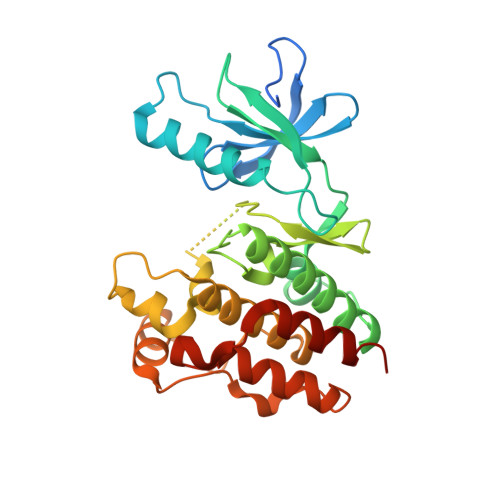Inhibitors of BRAF dimers using an allosteric site.
Cotto-Rios, X.M., Agianian, B., Gitego, N., Zacharioudakis, E., Giricz, O., Wu, Y., Zou, Y., Verma, A., Poulikakos, P.I., Gavathiotis, E.(2020) Nat Commun 11: 4370-4370
- PubMed: 32873792
- DOI: https://doi.org/10.1038/s41467-020-18123-2
- Primary Citation of Related Structures:
6P3D, 6P7G - PubMed Abstract:
BRAF kinase, a critical effector of the ERK signaling pathway, is hyperactivated in many cancers. Oncogenic BRAF V600E signals as an active monomer in the absence of active RAS, however, in many tumors BRAF dimers mediate ERK signaling. FDA-approved RAF inhibitors poorly inhibit BRAF dimers, which leads to tumor resistance. We found that Ponatinib, an FDA-approved drug, is an effective inhibitor of BRAF monomers and dimers. Ponatinib binds the BRAF dimer and stabilizes a distinct αC-helix conformation through interaction with a previously unrevealed allosteric site. Using these structural insights, we developed PHI1, a BRAF inhibitor that fully uncovers the allosteric site. PHI1 exhibits discrete cellular selectivity for BRAF dimers, with enhanced inhibition of the second protomer when the first protomer is occupied, comprising a novel class of dimer selective inhibitors. This work shows that Ponatinib and BRAF dimer selective inhibitors will be useful in treating BRAF-dependent tumors.
Organizational Affiliation:
Department of Biochemistry, Albert Einstein College of Medicine, Bronx, NY, USA.
















